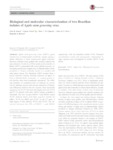Please use this identifier to cite or link to this item:
http://www.alice.cnptia.embrapa.br/alice/handle/doc/1071609Full metadata record
| DC Field | Value | Language |
|---|---|---|
| dc.contributor.author | SOUZA, E. B. | pt_BR |
| dc.contributor.author | NICKEL, O. | pt_BR |
| dc.contributor.author | FAJARDO, T. V. M. | pt_BR |
| dc.contributor.author | SILVA, J. M. F. | pt_BR |
| dc.contributor.author | BARROS, D. R. | pt_BR |
| dc.date.accessioned | 2017-06-28T11:11:11Z | pt_BR |
| dc.date.available | 2017-06-28T11:11:11Z | pt_BR |
| dc.date.created | 2017-06-28 | pt_BR |
| dc.date.issued | 2017 | pt_BR |
| dc.identifier.citation | Tropical Plant Pathology, v. 42, n. 5, p. 391-396, 2017. | pt_BR |
| dc.identifier.uri | http://www.alice.cnptia.embrapa.br/alice/handle/doc/1071609 | pt_BR |
| dc.description | Apple stem grooving virus (ASGV, genus Capillovirus) is disseminated worldwide, usually causing a latent infection in most commercial apple cultivars. However, infected scions grafted onto sensitive material display reduction of yield, loss of fruit quality and tree decline. In Brazil ASGV is associated with severe phloem necrosis, xylem pitting and decline of apple trees on Maruba-kaido (Malus prunifolia cv. Ringo) rootstocks usually in a complex with other latent viruses. Two Brazilian ASGV isolates from a mixed infection causing differing reactions on apple cv. Fuji on Maruba-kaido rootstocks, i.e., normal growth vs. tree decline, have been completely sequenced. The differing intensity of symptoms they co-induced on several woody indicator species/cultivars are indicative of biological differences between the two inocula. Their nucleotide sequences are 92.2% identical and display between 79.2% and 97.1% identity with other ASGV isolates available in GenBank. The two isolates (M219-3 and M220) shared 92.3% deduced amino acid (daa) sequence identity for ORF1, 95.3% for ORF2 and 93.3% for the CP gene. A high degree of daa identity, 95.8% and 96.6%, was ob- served between the CPs of M219 ? 3 and M220, respectively, with the Brazilian isolate UV01. Potential recombination events and phy logenetic relationships to major parents were investigated in isolates M219 ? 3and M220. Keywords ASGV . Apple virus . Phylogenetic analysis . Recombination | pt_BR |
| dc.language.iso | eng | pt_BR |
| dc.rights | openAccess | eng |
| dc.subject | Apple virus | pt_BR |
| dc.subject | ASGV (Apple stem grooving virus) | pt_BR |
| dc.subject | Phylogenetic analysis | pt_BR |
| dc.subject | Recombination | pt_BR |
| dc.title | Biological and molecular characterization of two Brazilian isolates of Apple stem grooving virus. | pt_BR |
| dc.type | Artigo de periódico | pt_BR |
| dc.date.updated | 2019-05-06T11:11:11Z | pt_BR |
| riaa.ainfo.id | 1071609 | pt_BR |
| riaa.ainfo.lastupdate | 2019-05-06 -03:00:00 | pt_BR |
| dc.identifier.doi | 10.1007/s40858-017-0163-3 | pt_BR |
| dc.contributor.institution | Elen B. Souza, Departamento de Biologia Celular, Universidade de Brasília, Brasília, DF 70910-900, Brazil; OSMAR NICKEL, CNPUV; THOR VINICIUS MARTINS FAJARDO, CNPUV; João M. F. Silva, Departamento de Biologia Celular, Universidade de Brasília, Brasília, DF 70910-900, Brazil; Danielle R. Barros, Departamento de Fitossanidade, Universidade Federal de Pelotas, Pelotas, RS 96010-900, Brazil. | pt_BR |
| Appears in Collections: | Artigo em periódico indexado (CNPUV)  | |
Files in This Item:
| File | Description | Size | Format | |
|---|---|---|---|---|
| TPPBiologicalmolecularcharacterizationASGV2017.pdf | 490,43 kB | Adobe PDF |  View/Open |









